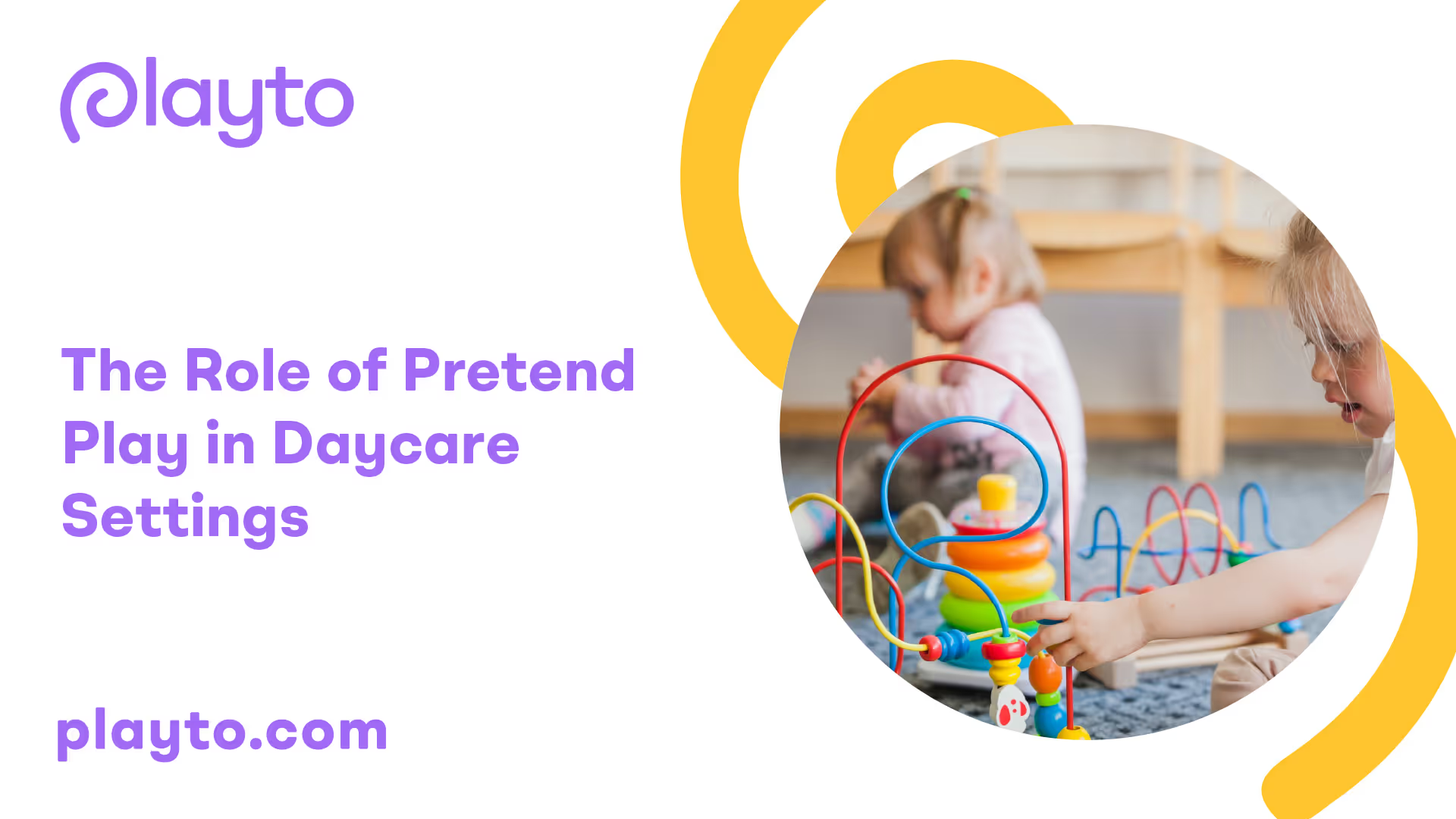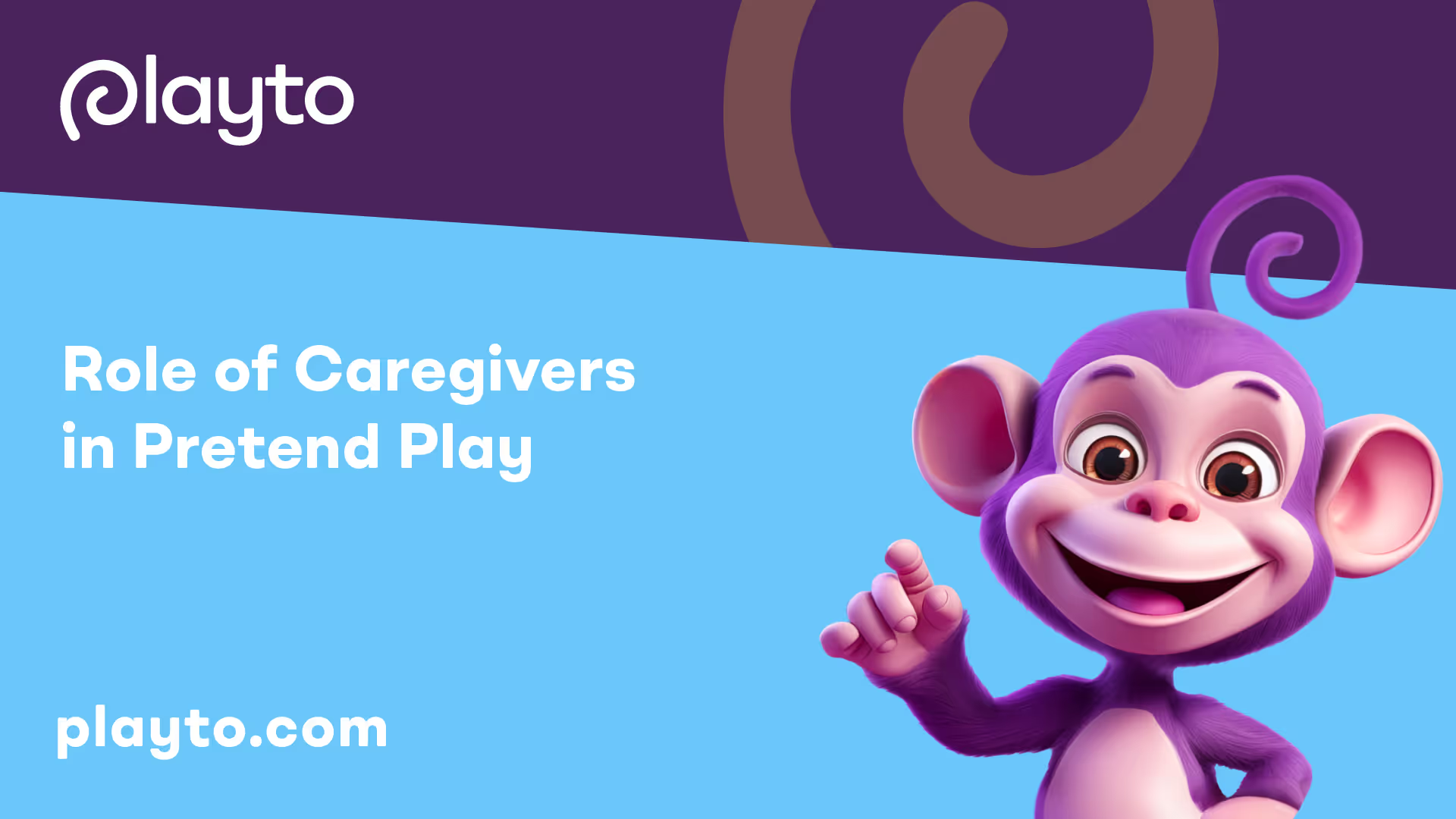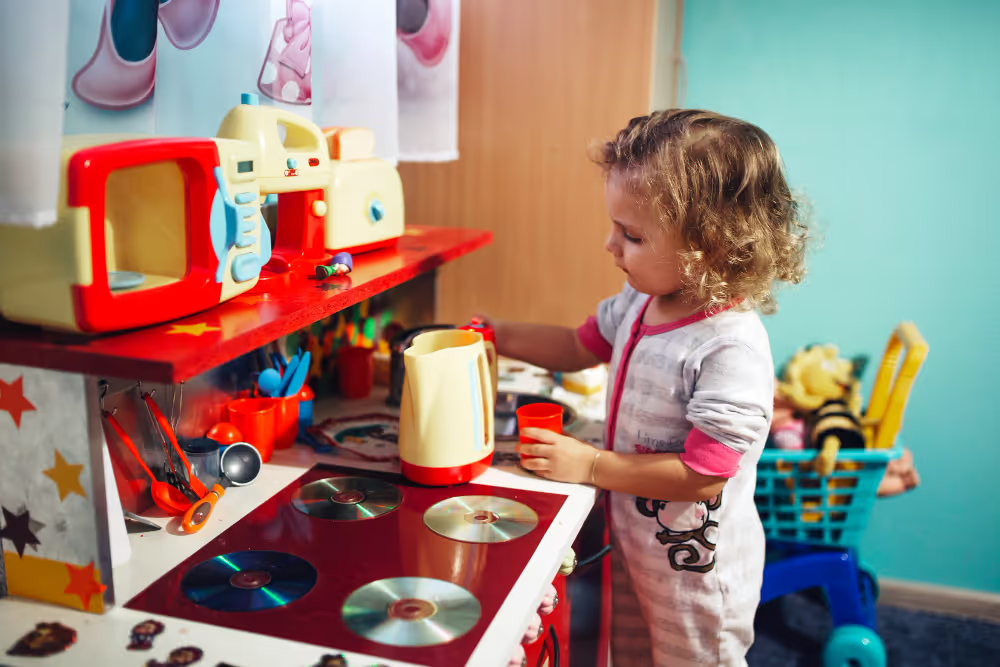Importance of Pretend Play in Daycare
Pretend play plays a vital role in daycare settings, offering numerous benefits for children's development. It not only stimulates their imagination and creativity but also contributes to cognitive development and social skills enhancement.

Cognitive Development Benefits
Engaging in pretend play allows children to exercise their cognitive abilities. Through imaginative scenarios and role-playing, children develop problem-solving skills, critical thinking, and the ability to think flexibly [1]. Pretend play provides opportunities for children to explore and understand real-life situations by simulating them in a safe and controlled environment.
By creating scenarios, such as playing house or setting up a pretend grocery store, children can practice various skills, including counting, sorting, and categorizing. These activities promote mathematical concepts and enhance cognitive abilities.
Social Skills Enhancement
Pretend play in daycare settings also plays a crucial role in developing social skills and emotional intelligence. When children engage in pretend play with their peers, they learn to cooperate, take turns, negotiate, and communicate effectively. It offers opportunities for children to practice empathy, understand others' perspectives, and engage in teamwork.
Through pretend play, children can temporarily step into different roles, allowing them to embody various mindsets, motivations, and perspectives. This helps in developing their understanding of different social roles and promotes the ability to see things from others' viewpoints. These experiences foster empathy and enhance social interactions.
Caregivers in daycare settings play a crucial role in encouraging and supporting pretend play among children. By providing an environment that nurtures imaginative play and by participating in play scenarios, caregivers help children develop their creativity, problem-solving abilities, and social skills.
Pretend play also has a positive impact on language development. As children engage in imaginative play, they naturally engage in conversations and use language to express their thoughts, ideas, and roles. This symbolic thinking aids in language development and vocabulary expansion. Playing with parents or peers exposes children to new phrases and words, contributing to their language skills.
In conclusion, pretend play holds immense importance in daycare settings. It promotes cognitive development, enhances social skills, and aids in language development. By encouraging and supporting pretend play, caregivers create an environment where children can explore, learn, and grow while engaging their imagination and creativity.
Types of Pretend Play
Pretend play is a crucial aspect of child development, allowing children to explore their imagination, enhance cognitive skills, and develop social abilities. There are different types of pretend play that children engage in during their daycare years. These include imitative play, symbolic play, dramatic play, and fantasy play.

Imitative Play
Imitative play typically begins between 13 to 18 months of age, as toddlers start imitating actions and activities they observe in their environment. They repeat snippets of actions they see, showcasing cognitive and memory skills. This type of pretend play involves imitating activities observed in their surroundings. For example, a child may pretend to talk on the phone or feed a doll, imitating actions they have witnessed.
Symbolic Play
Symbolic play usually emerges around 18 to 24 months and involves using one object to represent another. This marks a cognitive leap known as representation, where children understand that objects can stand for something else. They engage in imaginative play by using objects symbolically. For instance, they might pretend that blocks are ingredients for soup or use a stick as a pretend microphone. Symbolic play allows children to exercise their creativity and develop their cognitive skills by understanding and using symbols.
Dramatic Play
Around 2 1/2 to 3 years of age, children begin engaging in dramatic play. This type of play involves reenacting scenes from real life, such as mimicking bedtime routines, pretending to be a doctor, or setting up a pretend grocery store. Through dramatic play, children exercise their cognitive development by remembering sequences of events and engaging in small world play scenarios. They take on different roles, fostering their creativity and social skills.
Fantasy Play
Around 4 years old, children typically engage in fantasy play. In this type of play, children create and participate in more complex and unrealistic scenarios. They may pretend to be superheroes, princesses, or dinosaurs. Fantasy play stimulates cognitive development by allowing children to imagine scenes they have not experienced, fostering their understanding of abstract concepts. It encourages creativity, problem-solving, and the exploration of different perspectives and roles [3].
By understanding the different types of pretend play, caregivers in daycare settings can provide opportunities for children to engage in a variety of play experiences. Each type of pretend play contributes to the cognitive, social, and emotional development of children, fostering their imagination, creativity, and ability to understand and interact with the world around them.
Role of Caregivers in Pretend Play
Caregivers, whether parents or daycare providers, play a vital role in facilitating and enhancing the benefits of pretend play for children. By providing encouragement, support, and creating real-life scenarios, caregivers can help foster the development of various skills and abilities in children.

Encouragement and Support
Parents and caregivers have a significant impact on a child's engagement in pretend play. By providing encouragement and support, they create a safe and nurturing environment that allows children to freely explore their imagination and creativity. According to Bright Horizons, pretend play activities are as developmentally essential as any other pursuit, and parents and caregivers should recognize the value of these activities.
By actively participating in pretend play, caregivers can model appropriate behavior and demonstrate the enjoyment of imaginative play. This involvement encourages children to express their ideas and emotions, building their confidence and self-esteem. Caregivers can also provide positive reinforcement and praise, which fosters a sense of accomplishment and motivates children to continue engaging in pretend play.
Creating Real-Life Scenarios
Pretend play offers children the opportunity to explore and understand real-world situations in a safe and controlled environment. Caregivers can further enhance this learning experience by creating real-life scenarios that children can act out. For example, setting up a doctor's office or a grocery store in the play area allows children to engage in role-playing and develop essential life skills.
By incorporating real-life scenarios, caregivers help children make connections between their pretend play and the world around them. This type of play builds their understanding of social situations, problem-solving skills, and independence. According to HealthyChildren.org, engaging in pretend play using real-life scenarios, such as doctor's appointments or the first day of school, helps children develop the confidence to navigate real-world situations independently.
Caregivers can also provide props, costumes, and materials that support the chosen scenario. These resources encourage children to fully immerse themselves in their pretend play and enhance their imaginative abilities. By incorporating elements of reality, caregivers create opportunities for children to explore new scenarios, understand social dynamics, and develop problem-solving skills.
By actively engaging in pretend play with children, providing encouragement, and creating real-life scenarios, caregivers play a crucial role in maximizing the benefits of pretend play in daycare settings. Their involvement and support contribute to children's cognitive, social, and emotional development, helping them build confidence, creativity, and important life skills.
Developmental Milestones in Pretend Play
As children engage in pretend play, they go through various developmental milestones that reflect their cognitive growth and imaginative abilities. Understanding these milestones can help caregivers and educators create appropriate environments that support children's pretend play experiences.
Imitation (13-18 months)
Imitative play typically starts between 13 to 18 months, where toddlers begin to imitate actions they observe in their environment. This type of pretend play showcases cognitive and memory skills as children repeat snippets of activities they see. During this stage, children might imitate actions like feeding a doll, talking on a toy phone, or pretending to cook. Through imitation, children learn about cause and effect relationships and develop their understanding of the world around them.
Symbolism (18-24 months)
Around 18 to 24 months, children enter the stage of symbolic play, also known as representational play. Symbolic play involves using one object to represent another, demonstrating a cognitive leap in understanding that objects can stand for something else. For example, children may use a block as a phone or pretend that a spoon is a shovel. Symbolic play allows children to explore their creativity and imagination while developing their cognitive and language skills.
Dramatics (2 1/2 - 3 years)
Between 2 1/2 to 3 years, children enter the stage of dramatic play. This type of play involves reenacting scenes from real life, such as mimicking bedtime routines, grocery shopping, or doctor visits. Dramatic play showcases cognitive development as children remember sequences of events and engage in small-world play scenarios. By taking on different roles and scenarios, children develop their social and emotional skills, empathy, and problem-solving abilities.
Fantasy (4 years)
Around 4 years of age, children begin to engage in fantasy play. This type of play involves more complex and unrealistic scenarios, such as pretending to be superheroes, princesses, or dinosaurs. Fantasy play allows children to imagine scenes they have not experienced, fostering their understanding of abstract concepts and enhancing their cognitive development. By creating imaginative stories and exploring different roles, children develop their creativity, critical thinking, and communication skills.
Understanding the developmental milestones in pretend play can help caregivers and educators provide appropriate support and resources to enhance children's cognitive, social, and emotional development. By facilitating and encouraging different types of pretend play, children can explore their creativity and expand their understanding of the world around them. For more information on the role of pretend play in daycare settings, continue reading our article on the role of dramatic play in daycare settings.
Language Development Through Pretend Play
Engaging in pretend play not only sparks the imagination but also plays a significant role in language development for children in daycare settings. Pretend play provides a platform for children to exercise their language skills and expand their vocabulary. Let's explore how pretend play fosters language development through symbolic thinking and vocabulary expansion.
Symbolic Thinking and Language
According to HealthyChildren.org, imaginative play in daycare settings is crucial for language development. As children begin engaging in pretend play around the same time they start speaking their first words, playing with parents or peers exposes them to new phrases and words. Utilizing objects symbolically in pretend play scenarios aids in thinking symbolically, which is essential for learning and using language.
During pretend play, children assign meaning to objects that may not traditionally represent what they pretend them to be. For example, a block can transform into a phone, allowing children to engage in conversations and practice their language skills. This symbolic thinking helps children understand that words can represent objects and ideas, laying the foundation for language development.
Vocabulary Expansion
Pretend play provides children with a rich environment for vocabulary expansion. As they engage in imaginative scenarios, children encounter new phrases and words, allowing them to learn and practice language in a meaningful context. By assuming different roles and engaging in pretend conversations, children have the opportunity to use and understand words they may not typically encounter in their everyday lives.
Through pretend play, children also develop an understanding of language power and communication skills. They learn to cooperate and play together, enhancing their language and communication development. Interaction with peers and caregivers during pretend play further enhances their communication skills, as they negotiate roles, share ideas, and engage in imaginative dialogue.
Encouraging pretend play in daycare settings provides children with a language-rich environment, fostering vocabulary expansion and communication skills. By supporting and participating in their imaginative play, caregivers play a vital role in language development.
To explore more about the benefits of pretend play, continue reading our article on the role of dramatic play in daycare settings.
Pretend Play and Confidence Building
Pretend play in daycare settings plays a vital role in building confidence and self-esteem in children. By engaging in pretend play scenarios, children can gain the necessary skills and experiences to navigate real-world situations with confidence. Two key aspects of pretend play that contribute to confidence building are exploring real-world scenarios and developing problem-solving skills.
Real-World Scenarios
Encouraging pretend play with real-life scenarios, such as doctor's appointments or the first day of school, can help children develop the confidence needed to face these situations independently. By role-playing these scenarios, children can explore and understand what to expect, reducing anxiety and uncertainty. It allows them to practice interacting in social situations and understand the appropriate behaviors and responses.
Through pretend play, children can imagine themselves in different roles, such as a doctor, teacher, or parent, and gain a sense of empowerment. This role-playing helps them develop a better understanding of others and enhances their empathy and perspective-taking skills. By engaging in these real-world scenarios, children can build the confidence to handle similar situations in their everyday lives.
Problem-Solving Skills
Pretend play also fosters the development of problem-solving skills. When children engage in imaginative play, they encounter various challenges and obstacles that require creative problem-solving. Whether it's building a fort with limited resources or resolving conflicts between pretend characters, children learn to think critically and find solutions.
By navigating these pretend play scenarios, children develop essential executive function skills, such as planning, decision-making, and self-regulation. They learn to set goals, develop strategies, and adapt their actions to achieve desired outcomes. These problem-solving experiences in pretend play contribute to the development of a growth mindset, where children become more confident in their ability to face challenges and find solutions.
Through pretend play, children can develop essential skills that contribute to their overall confidence and self-assurance. By engaging in real-world scenarios and problem-solving, they gain the necessary tools to navigate social situations and tackle challenges. Encouraging and supporting pretend play in daycare settings provides a foundation for children to develop their sense of identity, explore their capabilities, and build the confidence needed for future endeavors.
To learn more about the role of pretend play in daycare settings, explore our articles on the role of music in daycare programs, the role of physical activity in daycare programs, and the role of music and movement in daycare programs.
